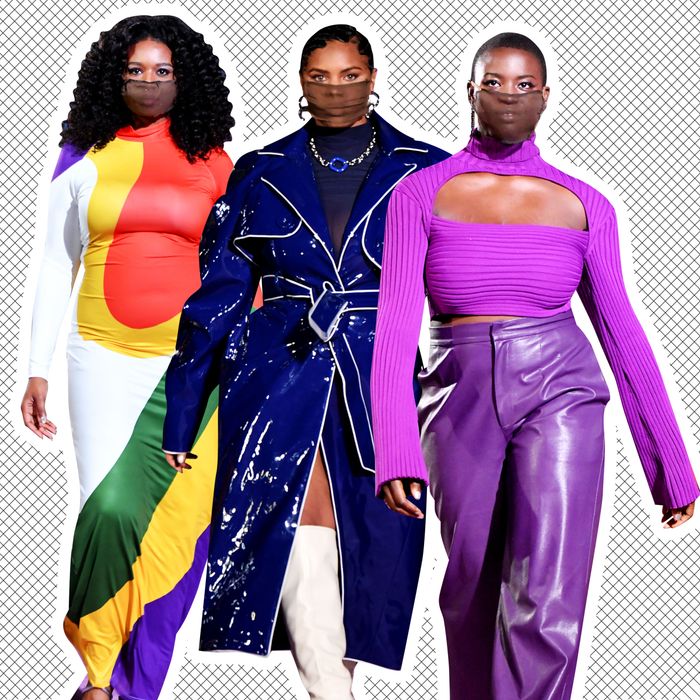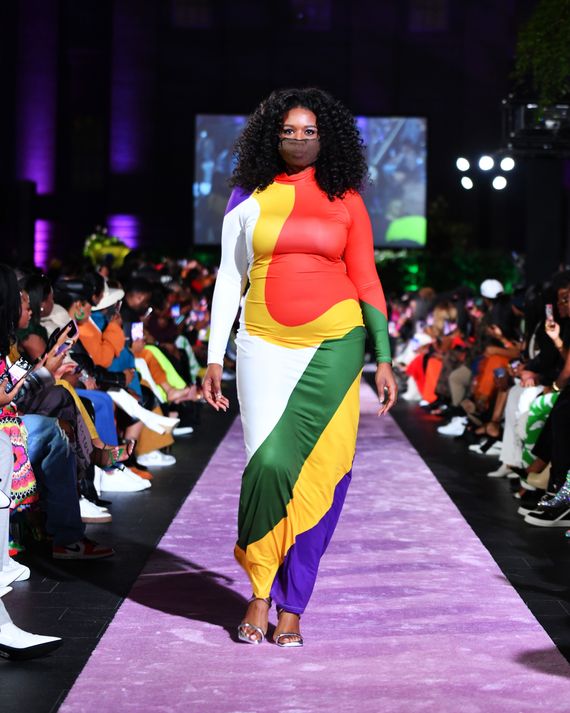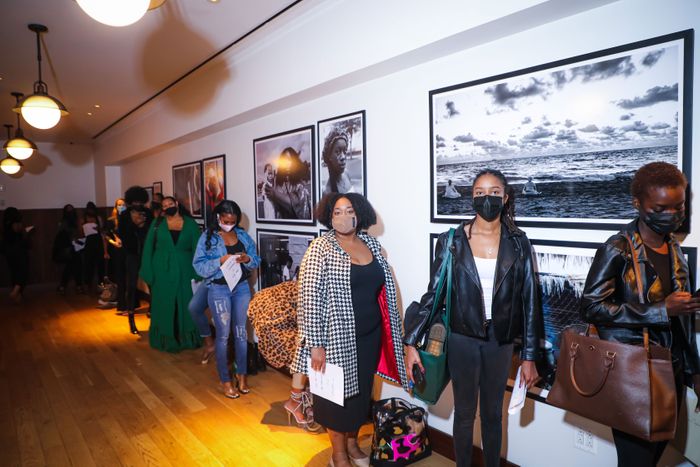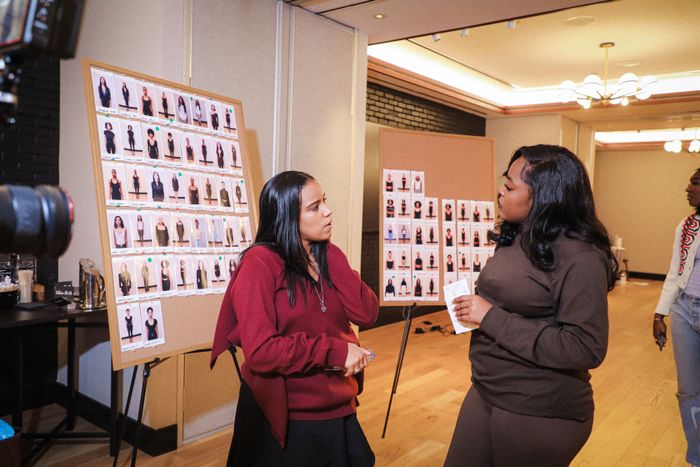
On a recent warmer-than-usual fall day, the National Portrait Gallery in Washington, D.C., was decked out with pink lighting, chairs engraved with “Hanifa” on the back, a pale-pink carpet as a runway, and a live orchestra that was performing songs like Drake’s “Laugh Now Cry Later.” Anifa Mvuemba, the 31-year old founder behind Hanifa, was having her first fashion show. Mvuemba never had plans to have a runway show. In fact, she’s built her brand by not adhering to the fashion industry’s standards. But earlier this year, when she was thinking about how she would celebrate a decade of her brand, she started planning one.
The big day had finally arrived. Hundreds of industry professionals, fellow designers, and fans of the brand —including some of the Housewives of Potomac — gathered to watch her designs make their way down the runway. Black models wearing a variety of hairstyles — sleek bobs, natural curls, and finger waves — and ranging in sizes wore signature colorful knits, excessively cuffed pants, and a royal-blue patent leather coat.
Mvuemba has gotten a lot of buzz for her designs, which embrace and are specifically designed for plus-size bodies and curves. In fact, they are the reason she has built her brand selling direct to consumers over Instagram and on her site. She relies solely on the community of women who follow her and buy her designs. “Even when we didn’t have a lot of support from the industry, our customers and community know we see them, and that makes a huge difference,” she said.
Her latest fashion show reflected these women. Plus-size models, who are usually sent down the runway in safe looks like long black dresses at other shows, instead wore sultry sheer jumpsuits, body-hugging dresses, and bold prints. The crowd cheered and gave Mvuemba a standing ovation.
The brand’s ethos might have started a decade ago, but the casting started just a week before the show. Mvuemba wanted to cast local models instead of flying in big names from places like New York and Paris. “There’s so much talent in D.C.,” Mvuemba said. She collaborated with casting director Kat Mateo, who’s known for challenging the industry’s conventional standards and has cast for brands like Pyer Moss. Mvuemba says Mateo “just gets it.” Together, they sought to book women who looked like her consumers. “Women’s bodies are a big narrative for the brand, and it’s important to show that,” she said. The woman she is speaking to, she said, “can be a size 2, but she’s also a size 12 and 16.”
Over 130 women lined up with their headshots to try their shot at being cast. “Whether I get it or not, I’ll be rooting for you and watching the show,” said one model.
In the hotel lobby of the casting, Mateo explained that she believes that lack of community is what holds a lot of designers back in the industry who don’t care to be as inclusive. “If our consumers are everyday people, why would we have them looking at a standard that’s not real?” Mateo asked. “The runway reflects the times, and the times of just a blonde girl walking are over. We should be representing what we see on the street every day.”
Being inclusive to size goes beyond the runway for Mvuemba. Each of her collections goes up to at least a 2XL. She knows that changing the industry’s size standards is not easy, especially as a young Black designer with fewer resources than larger houses, but for her, that is not an excuse. “Maybe it’s uncomfortable for people, but I also feel like they just don’t want to,” she said. Instead, she said, “they get a plus-size fit model to do plus-size pieces and a smaller fit model for other sizes.”
In the casting world, Mateo said that the excuses aren’t far behind, but she believes that labels like Hanifa are paving the way for everyone else. She also believes that not seeing diversity on the runway, whether it’s bodies, hair, or race, has a lot to do with people being stuck in their ways.
“That’s the holdup. It shouldn’t be that hard. Look around you,” she said. “It’s all over, and if you’re choosing to not see that, it’s because you’re stuck in your bubble, and that’s the problem. But if you want to be stuck in your bubble, I don’t think you should be reporting to the world, telling it what it should look like.” Mateo added that leaving out an entire sector of people isn’t doing your due diligence as a casting director.
What made casting for a Hanifa show different was that alongside looks, the casting directors looked for women with personality and confidence. They did this by creating a fun environment for models to just be themselves instead of focusing on what they thought the table of judges wanted to see. When asked her height, one model said, “I’m five-four, but my attitude is six feet.” They included her in the show.
“With fashion, there are all these criteria you have to meet in order to be that perfect person. Here, it’s different — it could be your personality or what you think of yourself,” Mateo says. “That’s the message Hanifa gets across: Everyone can be fabulous, and everyone can look good.”
Aside from community, the show was a celebration of what the brand has done within the last decade. Mvuemba wanted to display her pieces in a metamorphosis, arranging an array of colors that followed each other down the runway. She said, “A lot of times we’re taught to not embrace change, but I’m celebrating it.”
Article From & Read More ( What Hanifa Wants the Fashion Industry to Learn - The Cut )https://ift.tt/3oWLtGQ
Fashion
Bagikan Berita Ini

















0 Response to "What Hanifa Wants the Fashion Industry to Learn - The Cut"
Post a Comment